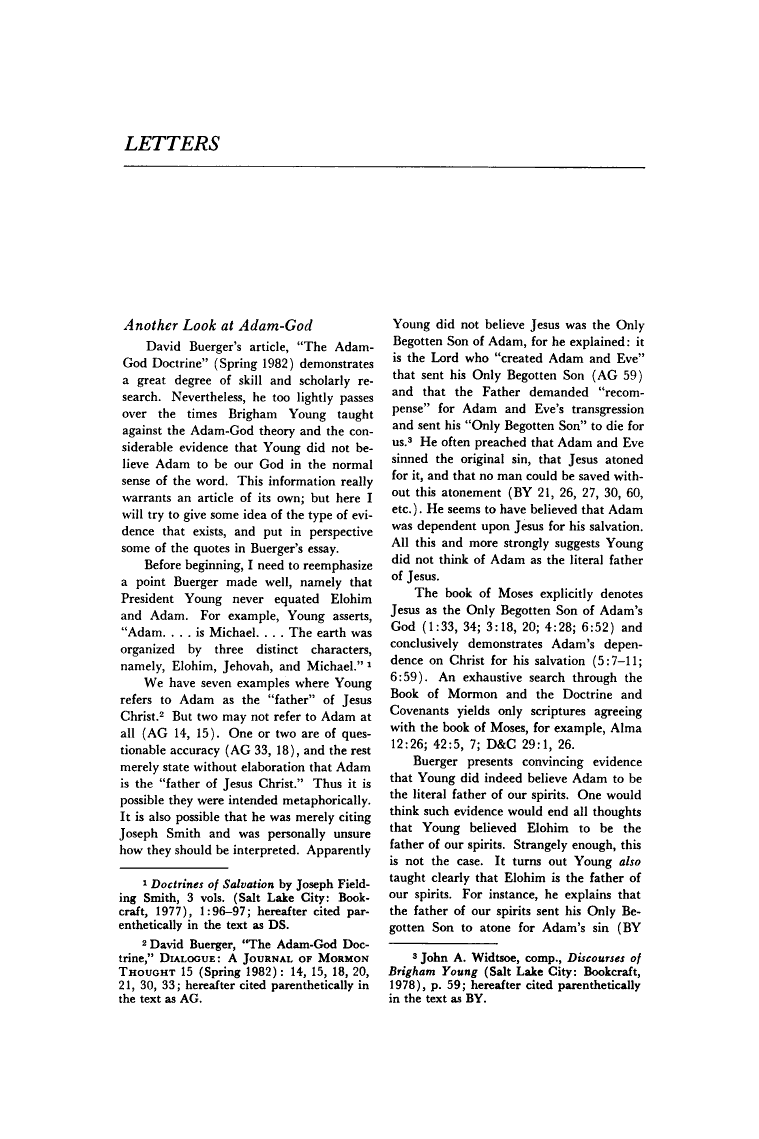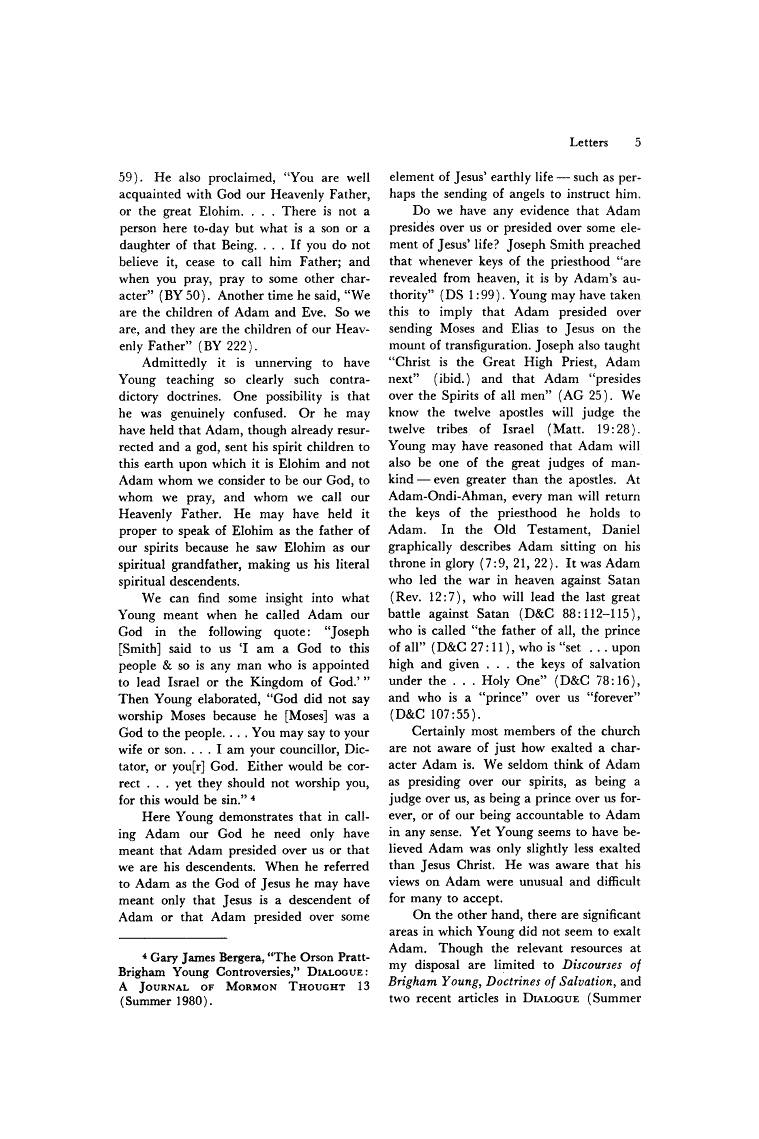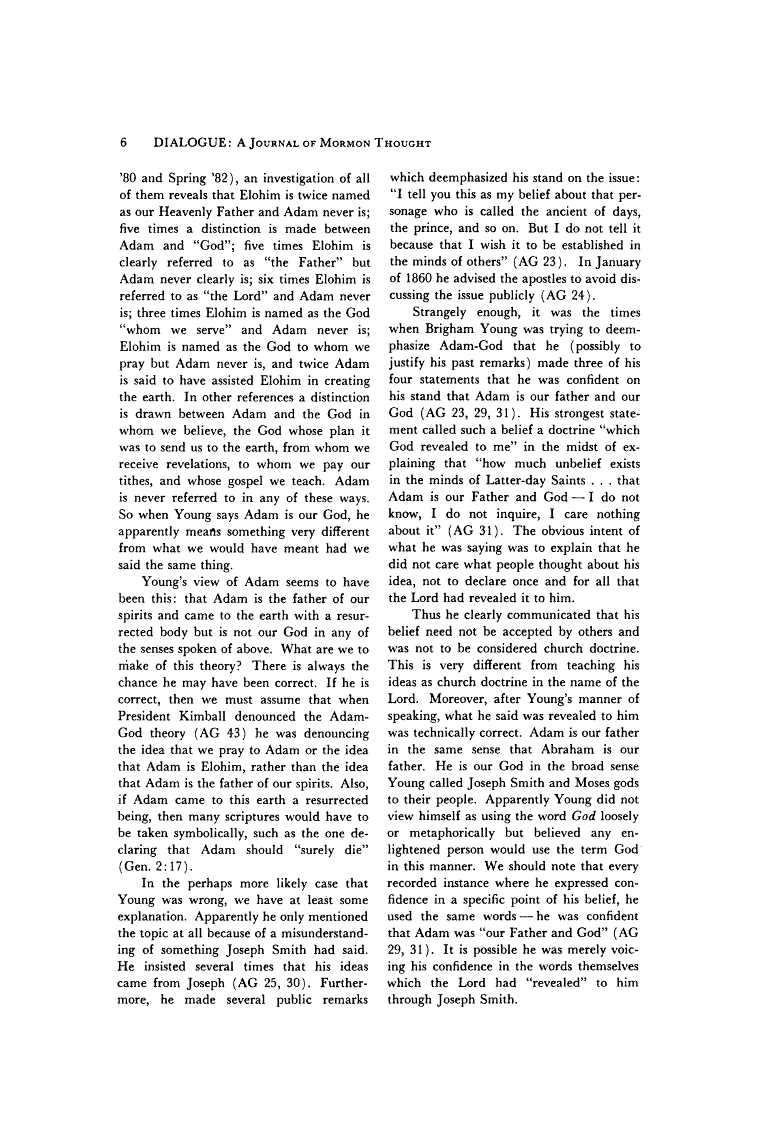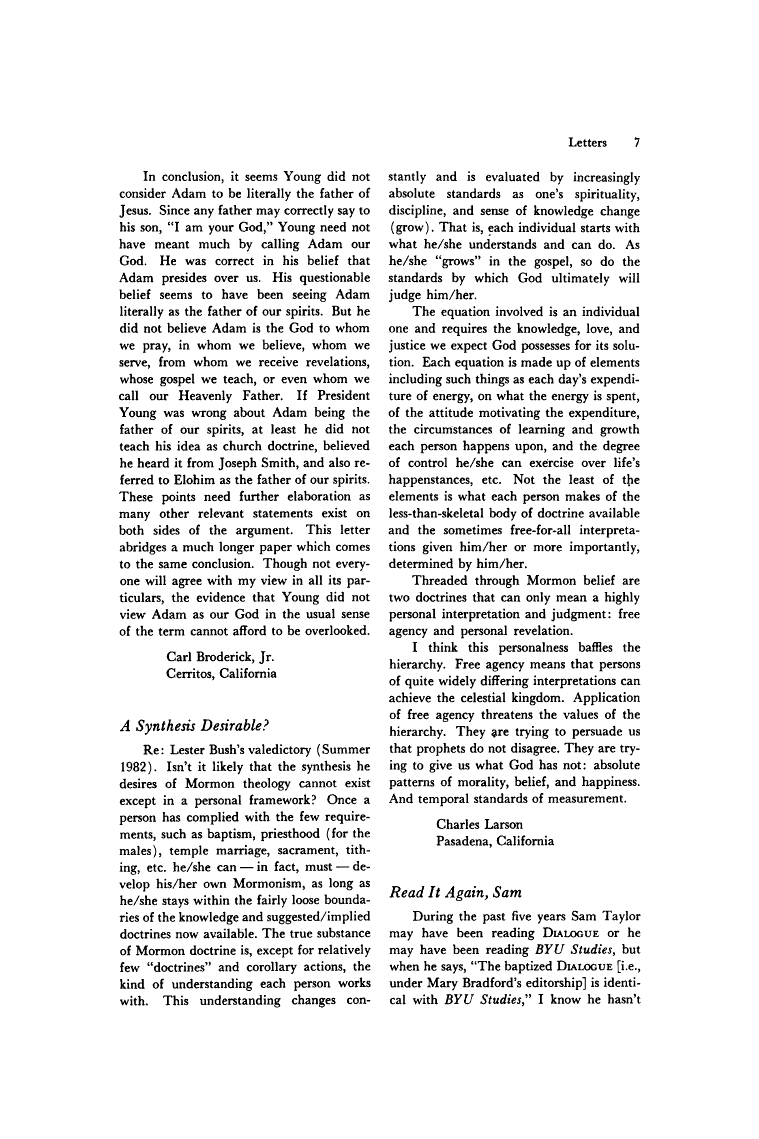Carl Broderick reviews David John Buerger's article on Adam-God; argues that Brigham Young often contradicted himself on core tenets of the Adam-God teaching.
- Type
- Periodical
- Source
- Carl Broderick LDS
- Hearsay
- Direct
- Reference
Carl Broderick, "Another Look at Adam God," Dialogue: A Journal of Mormon Thought 16 no. 2 (Summer 1983): 4-7
- Scribe/Publisher
- Dialogue: A Journal of Mormon Thought
- Audience
- Reading Public
- Transcription
David Buerger's article, "The Adam-God Doctrine" (Spring 1982) demonstrates a great degree of skill and scholarly research. Nevertheless, he too lightly passes over the times Brigham Young taught against the Adam-God theory and the considerable evidence that Young did not believe Adam to be our God in the normal sense of the word. This information really warrants an article of its own; but here I will try to give some idea of the type of evidence that exists, and put in perspective some of the quotes in Buerger's essay.
Before beginning, I need to reemphasize a point Buerger made well, namely that President Young never equated Elohim and Adam. For example, Young asserts, "Adam.... is Michael.... The earth was organized by three distinct characters, namely, Elohim, Jehovah, and Michael.”
We have seven examples where Young refers to Adam as the "father" of Jesus Christ. But two may not refer to Adam at all (AG 14, 15). One or two are of questionable accuracy (AG 33, 18), and the rest merely state without elaboration that Adam is the "father of Jesus Christ." Thus it is possible they were intended metaphorically. It is also possible that he was merely citing Joseph Smith and was personally unsure how they should be interpreted. Apparently Young did not believe Jesus was the Only Begotten Son of Adam, for he explained: it is the Lord who "created Adam and Eve" that sent his Only Begotten Son (AG 59) and that the Father demanded "recompense" for Adam and Eve's transgression and sent his "Only Begotten Son" to die for us. He often preached that Adam and Eve sinned the original sin, that Jesus atoned for it, and that no man could be saved without this atonement (BY 21, 26, 27, 30, 60, etc.). He seems to have believed that Adam was dependent upon Jesus for his salvation. All this and more strongly suggests Young did not think of Adam as the literal father of Jesus.
The book of Moses explicitly denotes Jesus as the Only Begotten Son of Adam's God (1:33, 34; 3:18, 20; 4:28; 6:52) and conclusively demonstrates Adam's dependence on Christ for his salvation (5:7-11; 6:59). An exhaustive search through the Book of Mormon and the Doctrine and Covenants yields only scriptures agreeing with the book of Moses, for example, Alma 12:26; 42:5, 7; D&C 29:1, 26.
Buerger presents convincing evidence that Young did indeed believe Adam to be the literal father of our spirits. One would think such evidence would end all thoughts that Young believed Elohim to be the father of our spirits. Strangely enough, this is not the case. It turns out Young also taught clearly that Elohim is the father of our spirits. For instance, he explains that the father of our spirits sent his Only Begotten Son to atone for Adam's sin (BY 59). He also proclaimed, "You are well acquainted with God our Heavenly Father, or the great Elohim.... There is not a person here to-day but what is a son or a daughter of that Being.... If you do not believe it, cease to call him Father; and when you pray, pray to some other character" (BY 50). Another time he said, "We are the children of Adam and Eve. So we are, and they are the children of our Heavenly Father" (BY 222).
Admittedly it is unnerving to have Young teaching so clearly such contradictory doctrines. One possibility is that he was genuinely confused. Or he may have held that Adam, though already resurrected and a god, sent his spirit children to this earth upon which it is Elohim and not Adam whom we consider to be our God, to whom we pray, and whom we call our Heavenly Father. He may have held it proper to speak of Elohim as the father of our spirits because he saw Elohim as our spiritual grandfather, making us his literal spiritual descendants.
We can find some insight into what Young meant when he called Adam our God in the following quote: "Joseph [Smith] said to us 'I am a God to this people & so is any man who is appointed to lead Israel or the Kingdom of God.'" Then Young elaborated, "God did not say worship Moses because he [Moses] was a God to the people.... You may say to your wife or son.... I am your councillor, Dictator, or you[r] God. Either would be correct . . . yet they should not worship you, for this would be sin."
Here Young demonstrates that in calling Adam our God he need only have meant that Adam presided over us or that we are his descendants. When he referred to Adam as the God of Jesus he may have meant only that Jesus is a descendent of Adam or that Adam presided over some element of Jesus' earthly life--such as perhaps the sending of angels to instruct him.
Do we have any evidence that Adam presides over us or presided over some element of Jesus' life? Joseph Smith preached that whenever keys of the priesthood "are revealed from heaven, it is by Adam's authority" (DS 1:99). Young may have taken this to imply that Adam presided over sending Moses and Elias to Jesus on the mount of transfiguration. Joseph also taught "Christ is the Great High Priest, Adam next" (ibid.) and that Adam "presides over the Spirits of all men" (AG 25). We know the twelve apostles will judge the twelve tribes of Israel (Matt. 19:28). Young may have reasoned that Adam will also be one of the great judges of mankind--even greater than the apostles. At Adam-Ondi-Ahman, every man will return the keys of the priesthood he holds to Adam. In the Old Testament, Daniel graphically describes Adam sitting on his throne in glory (7:9, 21, 22). It was Adam who led the war in heaven against Satan (Rev. 12:7), who will lead the last great battle against Satan (D&C 88:112-115), who is called "the father of all, the prince of all" (D&C 27:11), who is "set . . . upon high and given . . . the keys of salvation under the . . . Holy One" (D&C 78:16), and who is a "prince" over us "forever" (D&C 107:55).
Certainly most members of the church are not aware of just how exalted a character Adam is. We seldom think of Adam as presiding over our spirits, as being a judge over us, as being a prince over us forever, or of our being accountable to Adam in any sense. Yet Young seems to have believed Adam was only slightly less exalted than Jesus Christ. He was aware that his views on Adam were unusual and difficult for many to accept.
On the other hand, there are significant areas in which Young did not seem to exalt Adam. Though the relevant resources at my disposal are limited to Discourses of Brigham Young, Doctrines of Salvation, and two recent articles in Dialogue (Summer '80 and Spring '82), an investigation of all of them reveals that Elohim is twice named as our Heavenly Father and Adam never is; five times a distinction is made between Adam and "God"; five times Elohim is clearly referred to as "the Father" but Adam never clearly is; six times Elohim is referred to as "the Lord" and Adam never is; three times Elohim is named as the God "whom we serve" and Adam never is; Elohim is named as the God to whom we pray but Adam never is, and twice Adam is said to have assisted Elohim in creating the earth. In other references a distinction is drawn between Adam and the God in whom we believe, the God whose plan it was to send us to the earth, from whom we receive revelations, to whom we pay our tithes, and whose gospel we teach. Adam is never referred to in any of these ways. So when Young says Adam is our God, he apparently means something very different from what we would have meant had we said the same thing.
Young's view of Adam seems to have been this: that Adam is the father of our spirits and came to the earth with a resurrected body but is not our God in any of the senses spoken of above. What are we to make of this theory? There is always the chance he may have been correct. If he is correct, then we must assume that when President Kimball denounced the Adam-God theory (AG 43) he was denouncing the idea that we pray to Adam or the idea that Adam is Elohim, rather than the idea that Adam is the father of our spirits. Also, if Adam came to this earth a resurrected being, then many scriptures would have to be taken symbolically, such as the one declaring that Adam should "surely die" (Gen. 2:17).
In the perhaps more likely case that Young was wrong, we have at least some explanation. Apparently he only mentioned the topic at all because of a misunderstanding of something Joseph Smith had said. He insisted several times that his ideas came from Joseph (AG 25, 30). Furthermore, he made several public remarks which deemphasized his stand on the issue: "I tell you this as my belief about that personage who is called the ancient of days, the prince, and so on. But I do not tell it because that I wish it to be established in the minds of others" (AG 23). In January of 1860 he advised the apostles to avoid discussing the issue publicly (AG 24).
Strangely enough, it was the times when Brigham Young was trying to deemphasize Adam-God that he (possibly to justify his past remarks) made three of his four statements that he was confident on his stand that Adam is our father and our God (AG 23, 29, 31). His strongest statement called such a belief a doctrine "which God revealed to me" in the midst of explaining that "how much unbelief exists in the minds of Latter-day Saints . . . that Adam is our Father and God--I do not know, I do not inquire, I care nothing about it" (AG 31). The obvious intent of what he was saying was to explain that he did not care what people thought about his idea, not to declare once and for all that the Lord had revealed it to him.
Thus he clearly communicated that his belief need not be accepted by others and was not to be considered church doctrine. This is very different from teaching his ideas as church doctrine in the name of the Lord. Moreover, after Young's manner of speaking, what he said was revealed to him was technically correct. Adam is our father in the same sense that Abraham is our father. He is our God in the broad sense Young called Joseph Smith and Moses gods to their people. Apparently Young did not view himself as using the word God loosely or metaphorically but believed any enlightened person would use the term God in this manner. We should note that every recorded instance where he expressed confidence in a specific point of his belief, he used the same words--he was confident that Adam was "our Father and God" (AG 29, 31). It is possible he was merely voicing his confidence in the words themselves which the Lord had "revealed" to him through Joseph Smith.
In conclusion, it seems Young did not consider Adam to be literally the father of Jesus. Since any father may correctly say to his son, "I am your God," Young need not have meant much by calling Adam our God. He was correct in his belief that Adam presides over us. His questionable belief seems to have been seeing Adam literally as the father of our spirits. But he did not believe Adam is the God to whom we pray, in whom we believe, whom we serve, from whom we receive revelations, whose gospel we teach, or even whom we call our Heavenly Father. If President Young was wrong about Adam being the father of our spirits, at least he did not teach his idea as church doctrine, believed he heard it from Joseph Smith, and also referred to Elohim as the father of our spirits. These points need further elaboration as many other relevant statements exist on both sides of the argument. This letter abridges a much longer paper which comes to the same conclusion. Though not everyone will agree with my view in all its particulars, the evidence that Young did not view Adam as our God in the usual sense of the term cannot afford to be overlooked.
Carl Broderick, Jr.
Cerritos, California
- Source Link
- https://www.jstor.org/stable/45228228
- Citations in Mormonr Qnas
The B. H. Roberts Foundation is not owned by, operated by, or affiliated with the Church of Jesus Christ of Latter-day Saints.




